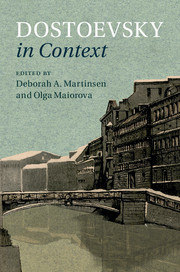Book contents
- Frontmatter
- Contents
- List of illustrations
- Notes on contributors
- Acknowledgments
- Note on citation, transliteration, glossary, and dates
- Chronology
- 1 Introduction: the many worlds of Dostoevsky
- PART I SOCIAL, HISTORICAL, AND CULTURAL CONTEXTS
- i CHANGING POLITICAL, ECONOMIC, AND SOCIAL LANDSCAPE
- ii POLITICAL, SOCIAL, AND CULTURAL INSTITUTIONS
- iii SPACE AND PLACE
- iv RELIGION AND MODERNITY
- 21 Orthodox spirituality
- 22 Religious dissent
- 23 Roman Catholicism
- 24 Islam
- PART II LITERATURE, JOURNALISM, AND LANGUAGES
- Glossary
- Further reading
- Index
- References
21 - Orthodox spirituality
from iv - RELIGION AND MODERNITY
Published online by Cambridge University Press: 18 December 2015
- Frontmatter
- Contents
- List of illustrations
- Notes on contributors
- Acknowledgments
- Note on citation, transliteration, glossary, and dates
- Chronology
- 1 Introduction: the many worlds of Dostoevsky
- PART I SOCIAL, HISTORICAL, AND CULTURAL CONTEXTS
- i CHANGING POLITICAL, ECONOMIC, AND SOCIAL LANDSCAPE
- ii POLITICAL, SOCIAL, AND CULTURAL INSTITUTIONS
- iii SPACE AND PLACE
- iv RELIGION AND MODERNITY
- 21 Orthodox spirituality
- 22 Religious dissent
- 23 Roman Catholicism
- 24 Islam
- PART II LITERATURE, JOURNALISM, AND LANGUAGES
- Glossary
- Further reading
- Index
- References
Summary
Nikolai Berdyaev, émigré philosopher and major disseminator of Orthodoxy in the Western world, aptly characterized the Orthodox faith as follows: “Orthodoxy is before all else, not a doctrine, not an external organization, not an external norm of behavior but a spiritual life, a spiritual experience and a spiritual path.” In the eyes of its believers, Orthodoxy differs from Western Christianity by its cultivation of spirituality. They believe that Western Christianity's cultivation of reason, beginning with the Scholasticism of the Middle Ages and continuing through the Renaissance and the Reformation, resulted in a religion that rationalizes faith and grows aloof from its spiritual side; Eastern Christianity, on the other hand, treasures the mystical experience of faith. Dostoevsky not only shared this view, he condemned Western Christianity, and especially Roman Catholicism, for having betrayed its essence by allying itself with the state.
For a growing group of educated Russians, the Russian church had also compromised itself by forming a coalition with the state and losing touch with the spirituality cherished by the common people. Using a language foreign to common believers, academic theology grew deaf and lost access to “the beating of the Church's heart,” that is, the church as a spiritual unity of believers. This process began in the seventeenth century when a debate between proponents and opponents of reforms in ritual practice resulted in a disastrous schism (raskol) that continues to divide the Russian church to this day. The many believers who did not accept the new rituals (the most provocative being the change in making the sign of the cross using three rather than two fingers) were called Old Believers (starovery) and were esteemed by the common people (narod*), because they preserved many traditions of Orthodox spirituality. In the eighteenth century, the ecclesiastical reforms of Peter the Great (1682–1725) deepened the rift between the institutional church and popular piety. Determined to diminish the church's power – and thus hoping to avoid further schisms – in 1721 Peter enacted the Spiritual Regulation which tied the church strongly to the state: the office of patriarch, who led the Russian church, was abolished and replaced by the Holy Synod*, an apparatus of both clergy and laymen presided over by the tsar's secular appointee, the Chief Procurator.
- Type
- Chapter
- Information
- Dostoevsky in Context , pp. 187 - 193Publisher: Cambridge University PressPrint publication year: 2016



